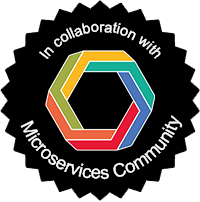Microservices 2022
The International Conference on Microservices is a forum for the discussion of all aspects of microservices: their design, programming, and operations. The 2022 edition of the conference (Microservices 2022) will take place in Paris, France.
-
Dates: 10-12 May 2022.
-
Venue: MSH Paris Nord.
The conference’s overarching aim is to bring together industry and academia, to foster discussion on practice and research of microservices.
Microservices 2022 is part of a conference series started with Microservices 2017 which successfully brought together many international practitioners and researches interested in the software paradigm of microservices. During Microservices 2017 the Microservices Community was founded with the aims of sharing of knowledge, fostering of collaborations, and organising events around microservices.
Keynote Speakers


Crossing the Chasm Between AI Services and AI-powered Workflows
Fabio Casati
Servicenow, USA

Microservices in the Age of Digital Transformation
The general theme of Microservices 2022 is the aspects of microservices in the age of digital transformation.
- On the one hand, the adoption of microservices is fostering the adoption of new architectural patterns and software construction practices; understanding the security properties (or the emerging vulnerabilities) of the resulting constructs calls for the development of a fresh mindset in analysts, designers and testers alike. In addition, the additional middleware and infrastructure typically proposed for the management of microservice-based architectures could expand the attack surface of the systems.
- On the other hand, microservices are often adopted as an accelerator of digital transformations. Some of the opportunities in microservices involve the development of sustainable practices, the application of artificial intelligence and machine learning, and new architectures and technologies. In this light, addressing the complexity of digital transformation should be a primary concern for microservices researchers and practitioners, while improving/enhancing microservices principles, patterns, architectures, security, and technologies.
Microservices welcomes both theoretical and experimental submissions on topics ranging from formal frameworks to industrial experience reports and demonstrations. Presentations will be selected based on abstract submissions of maximum two pages. See the call for papers for details.
Scope and Topics
The theme of this edition is aspects of microservices in the age of digital transformation.
-
On the one hand, the adoption of microservices is fostering the adoption of new architectural patterns and software construction practices; understanding the security properties (or the emerging vulnerabilities) of the resulting constructs calls for the development of a fresh mindset in analysts, designers and testers alike. In addition, the additional middleware and infrastructure typically proposed for the management of microservice-based architectures could expand the attack surface of the systems.
-
On the other hand, microservices are often adopted as an accelerator of digital transformations. Some of the opportunities in microservices involve the development of sustainable practices, the application of artificial intelligence and machine learning, and new architectures and technologies. In this light, addressing the complexity of digital transformation should be a primary concern for microservices researchers and practitioners, while improving/enhancing microservices principles, patterns, architectures, security, and technologies.
We are interested in all aspects and phases of the design and implementation of microservice architectures:
- Software engineering methods for microservices, specifically (but not limited to) agile service design practices, behavior- and domain-driven design
- Formal models for microservices
- Programming languages, notations, and techniques for microservices
- Verification (both static and runtime) of microservice systems
- Testing for microservices: unit tests, system tests, acceptance and regression tests, test-driven service development
- DevOps for microservices, in particular (but not limited to) continuous deployment and distributed monitoring
- Microservice management: fault, configuration, accounting/cost, performance, security
- Discovery/recovery and reverse engineering of microservices solutions
- Microservice evolution
- Methodologies for identification, specification, and realization of candidate services
- Patterns for cloud-native application architectures; service API design and management
- Microservices infrastructure components: API gateways, side cars, and service meshes; reactive messaging brokers; service registries; service containers and cluster managers; infrastructure as code
- Function-as-a-service and serverless cloud offerings; service-based event sourcing and data streaming architectures
- Security and other service quality concerns (consistency, availability, recoverability) in microservices; dealing with General Data Protection Regulation (GDPR) compliance and other data privacy requirements Testing for microservices: unit tests, system tests, acceptance and regression tests, test-driven service development Internet technologies: services, human interactions, data analytics and AI for IoT, architecture things centric, sensor networks, security, privacy, applications
- AI and Microservices (including Datasets, Open-source technology)
- Cyber-physical Systems: AI/ML applications, security
- Industrial case studies and applications: Data Science/Big Data, Smart Industry, Healthcare, Government, Manufacturing, Logistics and Supply Chain Management
- Empirical studies of microservices adoption
- Case Studies and Surveys on the topic of Microservices
- Sustainable practices in the Microservices community
- Education about Microservices technologies
We solicit contributed talks based work in progress, scientific work published or submitted for publication, or practical experience reports. Authors wishing to present their work are invited to submit extended abstracts following the submission guidelines. Abstracts and presentations must be in English.
Post-proceedings
Depending on the success of this initiative, we are considering the publication of a volume of post-proceedings, for which there will be a separate call for papers. In this way, the interested authors will have a chance to enrich their contributions according to the feedback they received during the event.
Please contact the chairs if you have questions.
Submission
A submission should describe a talk to be given at the conference in the form of extended abstracts with a maximum of two pages for talks from industry and six pages for academic presentations (including references). Submissions can be based on work in progress, scientific work published or submitted for publication, practical experience reports, or practical tool demonstrations. They must further be prepared using the EasyChair template (LaTeX, MS Word), be in PDF format, printable in black and white on A4 paper, and interpretable by common PDF tools. Submissions must be in English.
Contributions may be submitted via EasyChair by clicking the button below. The submission deadline is March 04, 2022 AoE. Resubmissions are allowed until the submission deadline.
Contributions will be reviewed and selected by the Program Committee. Extended abstracts of accepted contributions will be available electronically before the conference. Selected contributions will be invited to submit manuscripts based on their abstracts for conference post proceedings.
For more details on the conference’s scope and topics see the extensive Call for Papers.

